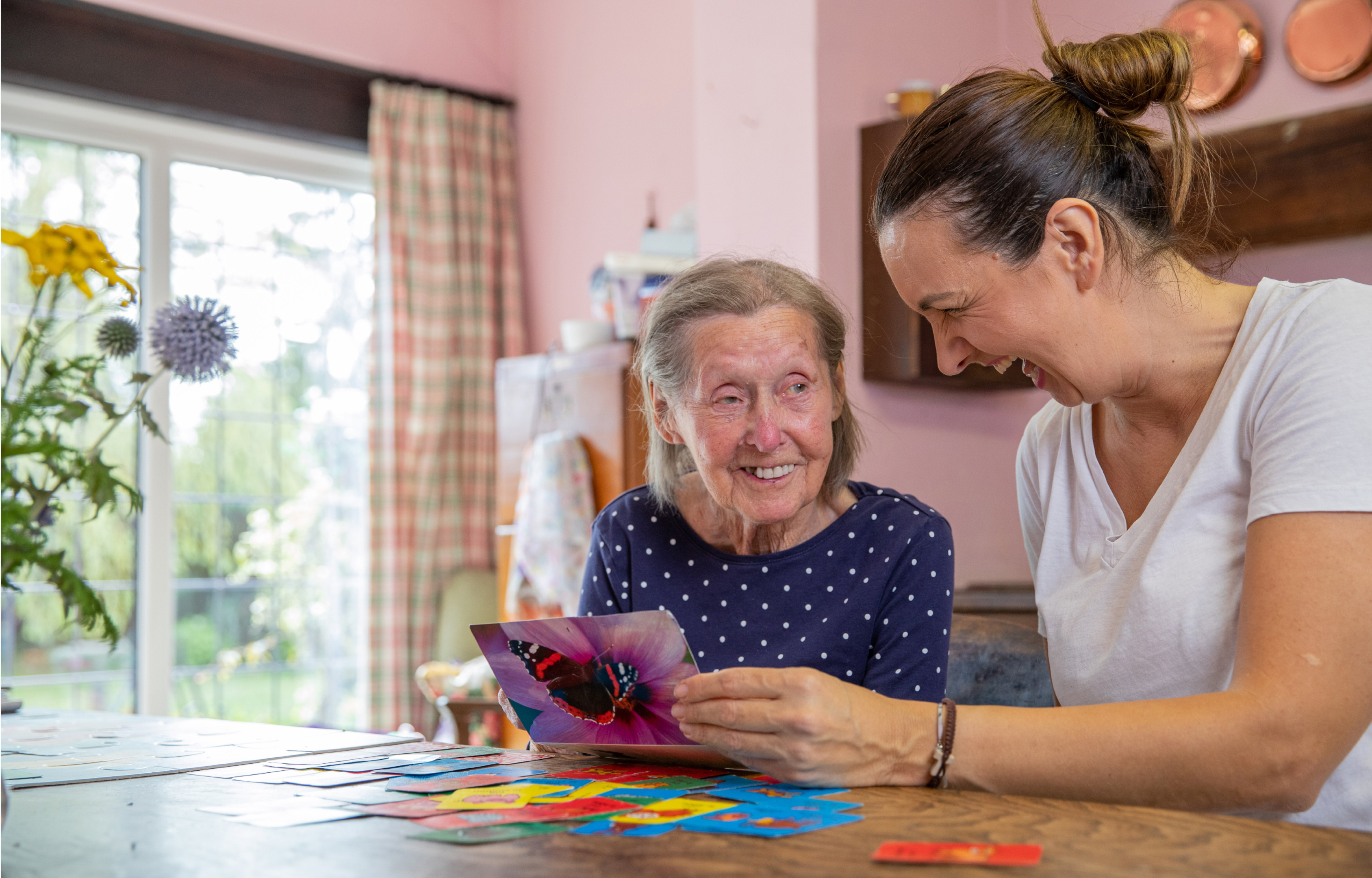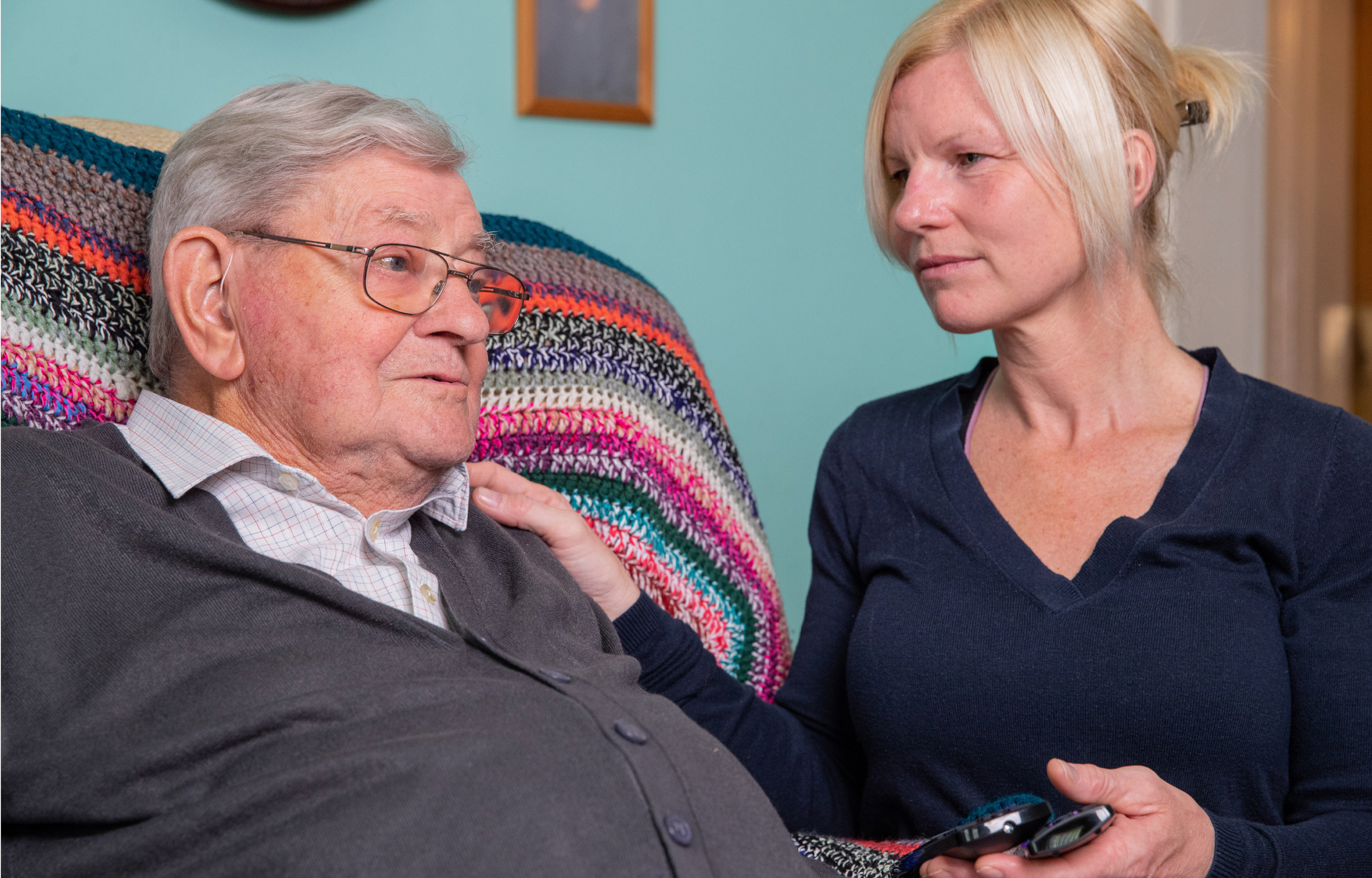Live-in care or a care home: what are my options?
If you have reached the point where you are starting to require more regular assistance and support with your daily activities, you may start to consider if and what type of care is appropriate.
I thought a care home was the only option?
In today's modern world, homecare services are proving to be increasingly popular and effective options for those looking to lead a comfortable life in their own homes, often with the love and support of their family members and loved ones.
Families often encounter a difficult journey when deciding on what care option is the best for their loved ones who are faced with life-altering circumstances such as stroke, falls or dementia.
Finding the right solution can make all the difference in creating positive outcomes during this transitionary period.
Tailored care plans allow 97% of us stay in our cherished residences - even with complex health conditions like dementia.
No longer do we have to leave our treasured homes; Bluebird Care Birmingham West can provide support solutions which make it possible for many people across all stages of life remain securely lodged within their own four walls – allowing them access not only traditional comforts but also greater independence and peace of mind in their daily life.

What is the right choice: a care home or care at home?
Navigating the care landscape for you or your loved one can be a difficult and daunting task.
Fortunately, there are experienced professionals, such as social workers and other health professionals, who may support you in assessing potential options to find which is most suitable. Utilising their advice could provide invaluable guidance throughout this process.
Many families may assume that the only alternative for care is by considering care homes or hourly homecare, and are new to considering what a live in care service could provide.
While these can provide invaluable support, it's not necessarily true that acceptance of one of them should be resigned - other solutions exist and seeking out those alternatives shouldn't be overlooked.
Caring for a loved one can be both emotionally and practically taxing, especially if you have to make significant adjustments to your life.
Often times it's not feasible or realistic for families to shoulder the burden themselves - medical conditions may necessitate professional attention with specialised expertise.
There is an array of choices available beyond just relying on family alone; seeking help from home care professionals might offer peace of mind that your loved one receives quality treatment in their own environment.

What are the different types of care services available?
As a leading provider of high quality home care and live in care, we have seen the outstanding outcomes having the right care and support has had on our service users physical and mental wellbeing.
However, we are all too aware that receiving care is a very personal decision, taking the first step to acknowledge that you need some type of care is the first big step, thereafter it is a decision as to whether this care should be in some type of residential home or with the support of 24-7 care in the comfort of your own home.
To help you make a more informed choice, we have summarised the various options that are available from residential care (care homes), nursing care, live in care and home care.
Careful consideration of the decision beforehand results in a better outcome compared to hasty decisions made under pressure.
In other words, having planned earlier would set you on a better course rather than making rushed decisions during a crisis.
Nursing homes
Nursing homes provide professionally-planned and supervised care, with registered nurses at the helm supported by specially trained care assistants. Together they make up a team of dedicated professionals committed to offering top quality elderly support services.
Nursing homes can offer specialised care packages for those with complicated health situations. If your loved one has complex medical requirements, this might be the only option to ensure they get personalised attention and support.
If a loved one transitions to a nursing home, they may need to adjust their behaviour as the home operates with purpose in order for everyone's safety and happiness. This could include setting a reasonable bedtime that respects other residents' routines.
Care homes
A care home tends to be the primary option for elderly care and is usually considered when a loved one is struggling to live alone.
For those residing in a care home, having their own bedroom and bathroom ensures personal space yet also offers companionship with other residents as they share communal areas.
Professional staff are always on hand to provide meals, upkeep services and necessary support such as mobility assistance – but the quantity of individualised attention may depend greatly upon how many members make up that particular team.
Assisted living
Assisted living provides a care solution that balances the need for help with daily activities and personal tasks, while still fostering independence.
It offers aid in numerous ways such as support for washing, dressing or taking medication - all tailored to individuals' specific needs.
Assisted living can be an ideal compromise between staying at home and a residential care facility, offering tailored private space with necessary support.
But there are also certain obstacles that could make this transition difficult, especially for individuals living with dementia; difficulty in securing available rooms as well as overworked staffs often lead to restricted visiting hours.
Live-in care
Live-in care provides aging individuals with invaluable support to help them maintain their independence and quality of life as they age, with the highest quality care within familiar surroundings.
Our experienced, dedicated caregivers provide personalised assistance from the comfort of our clients' homes - offering any necessary personal services such as bathing or dressing along with general support for daily activities like eating and mobility.
At its core, live in care services are about helping people realise their golden years in a safe yet meaningful way that gives them the opportunity to continue living life on their own terms.
Live-in care provides a unique and customisable solution for those seeking alternative support options to traditional residential services.
It offers the flexibility of having two professionals providing one-on-one assistance on a rotating schedule, typically with each professional working four weeks at a time before taking an entire week off.
For those in need of senior care, live-in options are often a desirable option. Despite this, families may be deterred by the perceived high live in care cost associated with such services.
In actuality however, many residential facilities include ‘hotel costs’ that are not incurred when receiving private home care.
Live in care services are a cost effective option for long term support, with numerous funding options available. Furthermore, your home's value isn't taken into consideration during the means testing process - making it even more accessible to those who need it most.

Dementia and live in care
In-home specialist dementia care provides invaluable stability to those living with conditions defined as dementia, including Alzeimher's and Vascular Dementia.
It offers them a reliable presence who is familiar and better able to help in intimate moments, fostering greater acceptance than what could be experienced at nursing homes where staff members may come and go more frequently.
Dementia live-in care can help those living with dementia retain a level of independence whilst receiving round the clock care, and continue to live a fulfilling life for as long as possible.
Dementia care is a specialist type of care which is carried out by those who are trained to do so.
How is live in care different to other types of care?
Home care not only provides your loved ones with an invaluable sense of companionship, but also gives them the support they need to keep doing what brings joy - from a thrilling game of Scrabble to leisurely gardening or other activities.
Live-in care is the perfect option for keeping your loved one close, allowing them to keep up with their everyday life and maintain all of the comfort that comes from living in a familiar environment.
With this service, there’s no need to part ways with any beloved possessions – just make room for warmth and companionship.
Will I like my live in carer?
To ensure the best possible experience for both client and live in carer, we carefully consider compatibility when making live in carer matches in line with your chosen lifestyle.
We go beyond simple skillset considerations to match individuals based on common interests – be it cooking or football - so they can build a meaningful connection with their new companion.
By having this individualised approach to matching clients and live in carers in place, you can rest assured that your loved one's needs will be met effectively and happily, with the right level of emotional support.
Will I get the right support for my personal care?
Your care plan will take into account your individual needs, ensuring you receive personalised support that respects and preserves your autonomy.
All our staff are trained to provide compassionate assistance in a sensitive manner with the utmost respect for privacy.
Should there be any tasks or activities you feel more comfortable doing yourself, we include this information within the care plan so it can easily be facilitated by all involved parties as part of your live in care package.
What does a good live in care provider look like?
The ultimate goal of a good live in care provider will be to enrich your lifestyle and give you the highest level of professional care allowing you to live independently within the comfort of familiar surroundings.
Providing high quality care means understanding every step of your live in care journey, to give you the best care and support in line with your personal care and needs.
Your care team will be available to support you round the clock with a fully managed service, have access to the best live in carers and be able to providing high quality home care over a 24 hour period.
A good live in care provider will also at least have a GOOD rating from the care quality commission (CQC), and be able to explain to you all the various live in care options available.
They will also typically provide more traditional forms of home care including domiciliary care and other specialist care services such as respite care, nursing care and palliative care, should your needs change or increase in the future.

How to choose a live in care provider
If you’re seeking the best option for live-in care, there are two approaches to consider. An introducer can help source a qualified carer at a lower cost; however, this brings with it several responsibilities.
Alternatively, if managed service is preferred - which employs full time staff and selects those most suited to your needs - then these tips may be of assistance in making an informed decision.
Check the CQC rating
With reputable live-in care companies being subject to regulation and inspection by the Care Quality Commission (CQC), finding a provider that meets your needs is only a few clicks away.
Through their postcode search tool, you can quickly identify providers in your area with ratings of Outstanding, Good, Requiring Improvement or Inadequate. Visit www.cqc.org.uk for more information on how this service might benefit you.
Reference them
With the help of websites like Trustpilot and Homecare.co.uk, it's easy to uncover personal reviews from those who have had a first-hand experience with live-in care providers.
These accounts can provide invaluable insight into what you should expect when considering this type of service - offering the same level of assurance as if coming from your own family or friends.
Get to know how they treat their carers
Exceptional caregiving is a two-way street - the best providers understand that in order to ensure outstanding care, their frontline staff must be provided sufficient support.
This includes arming them with practical and technical expertise as well as making sure they feel emotionally supported and financially secure.
Investigate prospective elderly care providers by asking about how dedicated they are to looking after their own live in carer.

How Bluebird Care Birmingham West can help
Bluebird Care Birmingham West providers expert and highly tailored live in care to support people in the comfort of their own home. We are proud to offer an alternative to traditional residential care homes that create such a positive impact on people's lives.
For further information on how we can support you or a loved one, please reach out to a member of the team today by calling us on 0121 803 6787, or email us at birminghamwest@bluebirdcare.co.uk.
How to find the right care for you or your relative
1. Find your local office
Bluebird Care delivers care from locally based offices, find yours to start your care journey today.
2. Get in touch with us
Fill in our call back form or give us a call to find out how we can help you.
3. Assessment
We’ll come out to you to find out what you or your loved one needs to help stay independent at home.
4. Care team chosen & care starts
You'll be cared for by our specially trained team to support you to remain at home for as long as possible.

